Martin Braithwaite on replacing Lionel Messi: ‘I’ve been clutch my entire life’
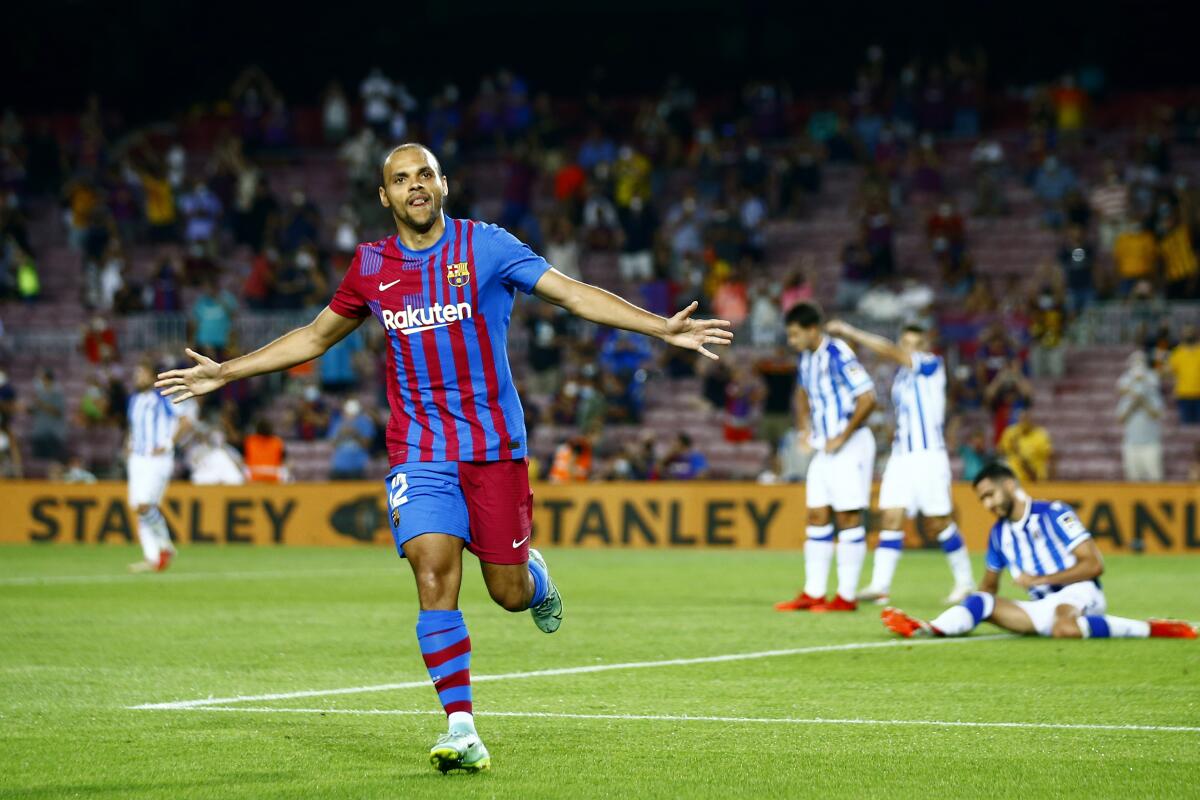
Hello and welcome to the L.A. Times soccer newsletter. I’m Kevin Baxter, the Times’ soccer writer, and we start today with Barcelona, which Sunday kicked off its first La Liga season without Lionel Messi in 17 years. We’ll get to the reasons why that happened shortly.
But we begin with forward Martin Braithwaite, one of the players Messi left behind in Spain and one who marked Messi’s departure with a pair of goals and an assist in Sunday’s 4-2 win over Real Sociedad.
Braithwaite had almost as interesting a summer as his former teammate. In addition to watching the Messi contract drama from afar, he nearly helped Denmark to a storybook finish in the Euros, released a four-part documentary series and was incorrectly labeled a billionaire by Forbes.
“It’s a goal of mine,” he said of the Forbes report. “We’re definitely looking forward to make it sooner rather than later.”
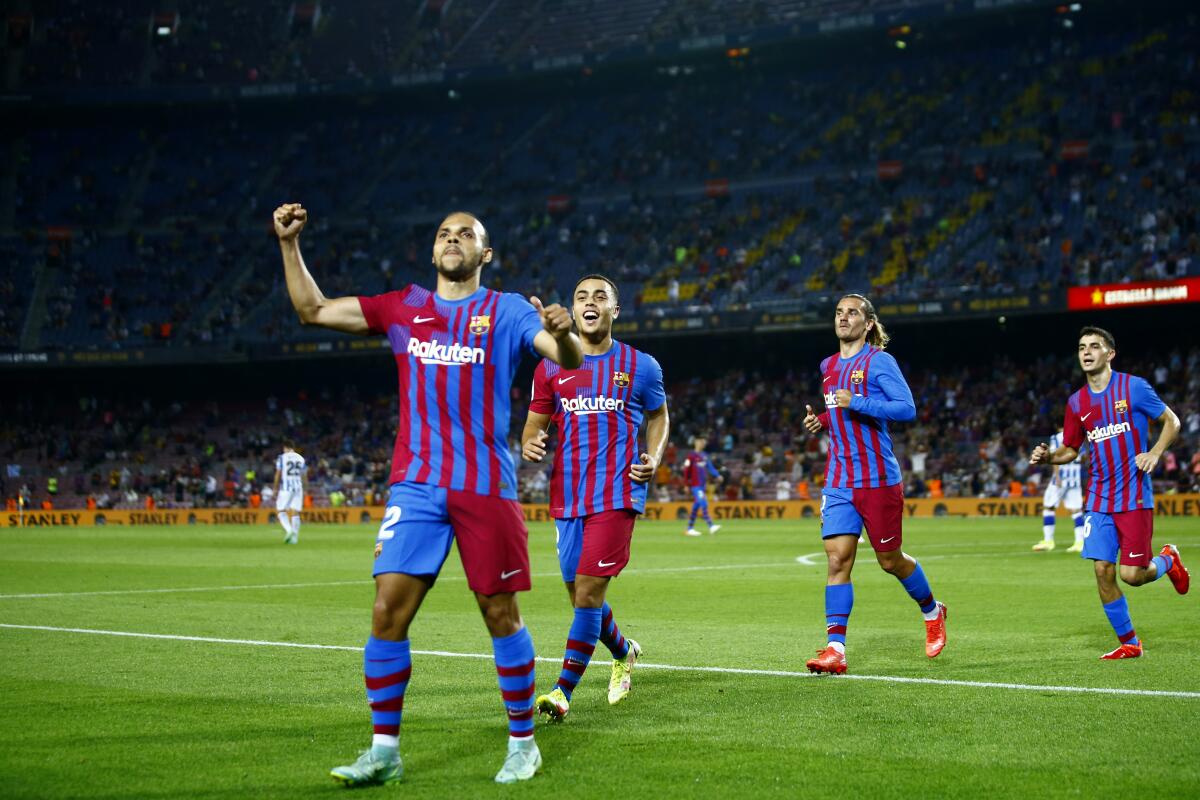
Sometimes you have to gently — or not so gently — prod players to open up a little during interviews. That wasn’t the case with Braithwaite, who asked that I email him the questions, then gave responses that were so interesting I’m not even going to try to construct some elaborate narrative in between his answers. Instead, I’ll mostly step aside and just insert some transitions to keep the conversation going.
The Euros, which were delayed a year by COVID-19, got off to a harrowing start for Denmark when midfielder Christian Eriksen collapsed in the 42nd minute of the first group-play game after going into cardiac arrest. Medical personnel performed cardiopulmonary resuscitation on Eriksen and used a defibrillator to literally bring him back from the dead.
“I’m telling you that was a miracle,” Braithwaite wrote. “There’s a look in someone’s face where you just know. He was gone.
“Christian is a special friend to me and something bigger than all of us was looking over him.”
After a lengthy pause the match was resumed with a stunned Denmark losing to Finland 1-0. The Danes also lost their next match to top-ranked Belgium by a goal but then beat Russia, Wales and the Czech Republic by a combined 10-2 to reach the semifinals.
The Eriksen tragedy helped inspire that run.
“I thought we were done but the energy of the crowd, the whole nation and the whole world, to be honest, lifted us,” Braithwaite said. “We have a very rich football tradition in Denmark. The two biggest things are probably the royal family and the national team.
“The country rallied behind us unlike anything I’ve ever seen. The Belgium game was the most impactful, emotional and overwhelming experience of my professional career. The energy was insane and it kept up until the semifinals.”
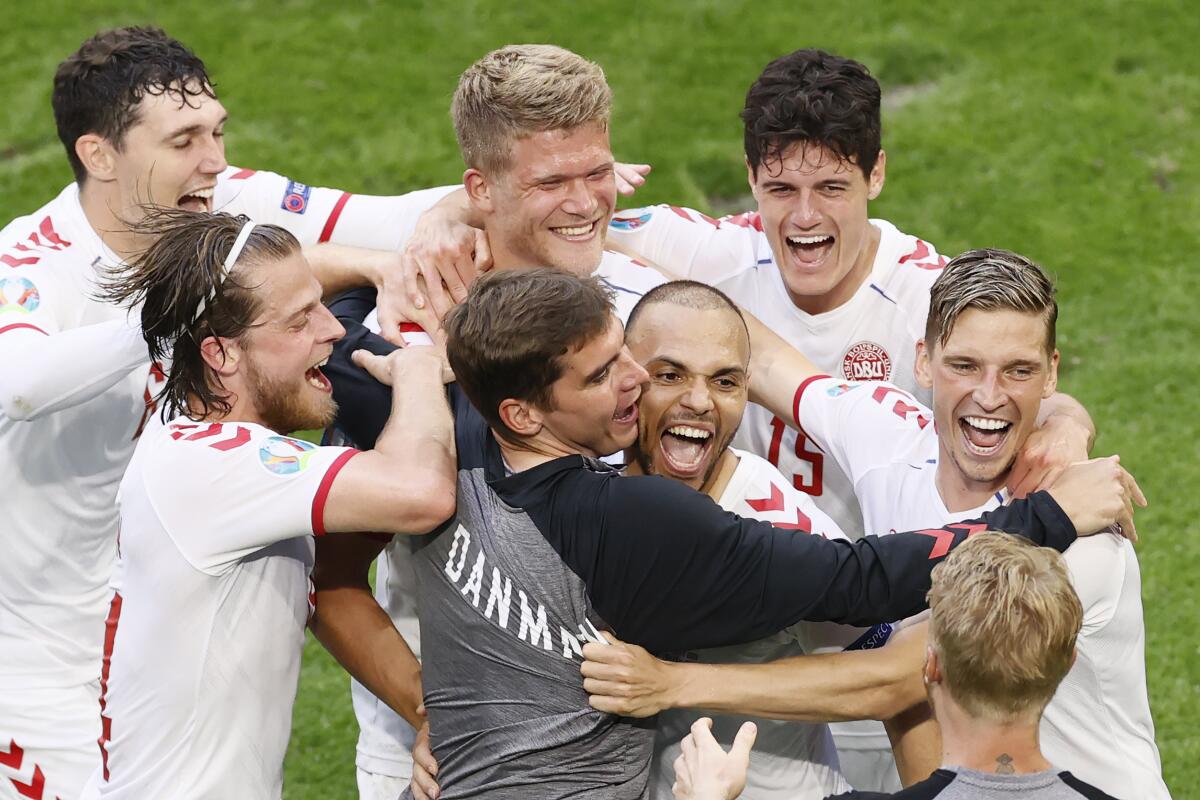
That’s when the storybook run ended in an extra-time loss to England. Still, the third-place finish was the best by Denmark in an international tournament since 1992, the year after Braithwaite was born. And it set the team up well for the resumption of UEFA World Cup qualifying in two weeks, where Denmark is unbeaten with a 14-0 goal differential three games into the group stage.
“I always expected us to go deep into the [Euros]. A lot of us play on world-class teams and we truly believed we could pull it home,” Braithwaite said. “We ended up in third place, which may look great on the outside. But as a team we wanted to win it and we felt like we could.
“We absolutely only have one goal on our mind for the World Cup and that’s the gold. Gold or bust.”
As for his club team, Braithwaite already has taken on a bigger role following Messi’s departure for Paris Saint-Germain. He made 42 appearances in all competitions last season, but just 15 of those were starts. His biggest goal came deep into stoppage time in the Copa del Rey semifinals and sent Barcelona onto the final which it won.
“On a club level my aim is always to be an impact player,” said Braithwaite, who already has matched his La Liga goal output from last season. “I’ve been clutch my entire life. People mostly know me for my runs, but I have a lot more in my repertoire that I really haven’t shown the world yet.
“I have a dynamic finish with both legs. I train to sprint like an Olympic sprinter and I can challenge my immediate defender with explosive dribbles.”
That’s only half of it. At 30, Braithwaite also is a businessman. And although he’s not a billionaire (yet) he is thinking about his nonplaying days. In addition to the documentary series, he’s a real estate investor and the co-founder of a fintech startup that helps children from at-risk communities improve their financial literacy and he’s released an investment app. He also owns a clothing brand and a restaurant.
The goal, he said, is to help create more financial inclusion and narrow the wealth gap.
“This is something we’re committed to for the long haul, to set a positive example for people of color, all colors,” said Braithwaite, who did his first real estate acquisition at 22. “I actually approach my job like a Fortune 500 executive. I read management books, leadership books, finance books. I’m a bit of a nerd in that regard.
“One of the things we see far too often with players in when they fail to prepare for what happens after their playing days are over. It’s easy to think it lasts forever but when you have higher income, you tend to have higher expenses.”
Which brings us back to Messi …
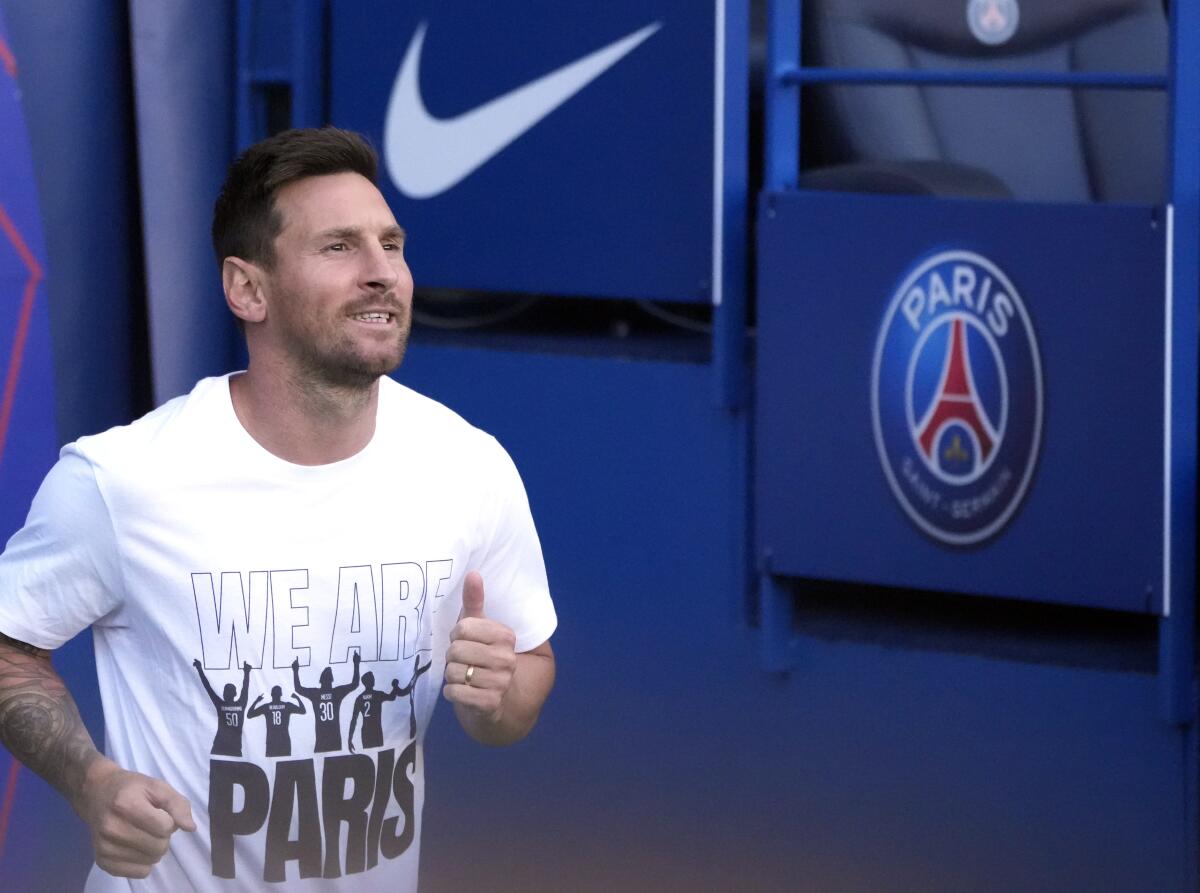
A Messi situation
…. because higher expenses is exactly what led to Barcelona’s inability to re-sign its marquee superstar, even after he agreed to a 50% pay cut. So the club had to let one of the best players in soccer history — one it had signed and developed from childhood — go. For free.
The problem wasn’t so much what Messi cost but how much the club spent. Barcelona, long one of the richest franchises in professional sports, spent money as fast as it earned it under former president Josep Maria Bartomeu. In the last seven years, the team reportedly spent more than $1.2 billion on players — including $400 million on Antoine Griezmann, Ousmane Dembele and Philippe Coutinho. Since 2017, the team’s payroll has risen by more than 50%.
So when COVID-19 hit, costing the team more than half a billion dollars in revenue, Barcelona’s debt soared. It now stands at about $1.6 billion, team president Joan Laporta said Monday. That made re-signing Messi not just problematic but impossible.
Because his last contract expired July 1, the new five-year deal he reportedly had negotiated with the club would have been treated as a new agreement and not a contract extension since Messi was a free agent. And that deal would have violated the league’s spending rules, what the club referred to as “financial and structural obstacles” to a new agreement.
La Liga’s financial fair-play rules require a club’s payroll reflect expected revenues, profits and losses from previous years, existing debt repayments and sources of external financing. Basically the idea is each club is given a budget it must adhere to, keeping it from drowning in a sea of red ink. Signing Messi would have pushed Barcelona well beyond its limit because the team already had contracts in place worth $88 million for Griezmann, Dembele and Coutinho alone.
Laporta said the team’s wage bill is now 103% of the club’s income, making Messi’s departure “sad, but necessary.”
In fact, Barcelona couldn’t have added Messi even if he decided to play for free unless they unloaded one of the other players first. That’s also affected four other recent signees — Sergio Aguero, Eric Garcia, Emerson and Memphis Depay — who could not be registered with the team until Barcelona proves its total payroll is below its league-mandated limit, believed to be about $188 million.
That figure was more than $791 million just two seasons ago, according to The Athletic.
On the eve of Barcelona’s season opener, veteran defender Gerard Piqué agreed to accept a “substantial” pay cut to allow the club to register Depay, Garcia and forward Rey Manaj. The club is hoping to work out similar salary reductions with Sergio Busquets, Sergi Roberto and Jordi Alba.
But if the departure of Messi helps Barcelona on the expenditure side it could have a devastating impact on the revenue side and impact game-day proceeds and the sale of jerseys and other team-branded merchandise.
That could force the league to drop the team’s wage bar even lower and start a financial spiral that could plague it for years.
It’s hard to feel sorry for Barcelona, though. It has been teetering on the brink of financial ruin for years yet continued to spend. La Liga’s fair-play rules have been in place since 2013 and the club knew there would be an eventual reckoning. The pandemic didn’t make that happen; it just made it happen sooner rather than later.
Now the soap opera that seemingly had enveloped Messi for years has moved to Paris. PSG got him for free but will still have to pay him a reported $41 million a year for two seasons with an option for a third year, when Messi will be 36. The Athletic reported there also was a $30 million signing bonus while Forbes said Messi gets a cut of player-image proceeds from things such as jersey sales, pushing the value of the deal to about $75 million for the 2021-22 season.
The signing is the latest desperate attempt by PSG’s Qatari owners to buy a Champions League title, something Messi won four times at Barcelona. For all its success in France’s Ligue 1, which it has won seven times in the last nine years, PSG never has won Europe’s most prestigious club competition. Ending that drought has become ownership’s primary goal.
To do that it has assembled a forward line of Messi, Kylian Mbappe and Neymar — a trio that will cost the team a more than $118 million-plus in salary alone, according to published reports. PSG has its own financial fair-play issues, namely the ones imposed by UEFA, which are far tamer compared to the La Liga guidelines.
PSG has been found in violation of those in the past, but with COVID-19 even UEFA’s lax rules probably won’t be strictly enforced. Revenues have fallen so drastically in the last year because of the virus a UEFA official said last spring it would be “purposeless” to try to enforce them. Instead, owners are being allowed to spend their own money to alleviate losses, Reuters reported.
That’s not a problem for PSG’s deep-pocketed owners or the Abu Dhabi owners of Manchester City, which recently broke the Premier League transfer record by paying $138 million to buy midfielder Jack Grealish from Aston Villa. Both teams have shown little interest in curbing their spending.
But it’s a major issue for Barcelona, which is owned by the club’s fans.
What the Messi saga proves is soccer’s financial model is broken and it’s only going to get worse. When a City or a PSG is allowed to spend what it takes to scoop up all of the best players, what chance does a more modestly financed club have of competing?
Barcelona made its mess and now it looks as if Real Madrid may be on the edge of financial disaster as well. As the dominoes continue falling what will be left in their wake?
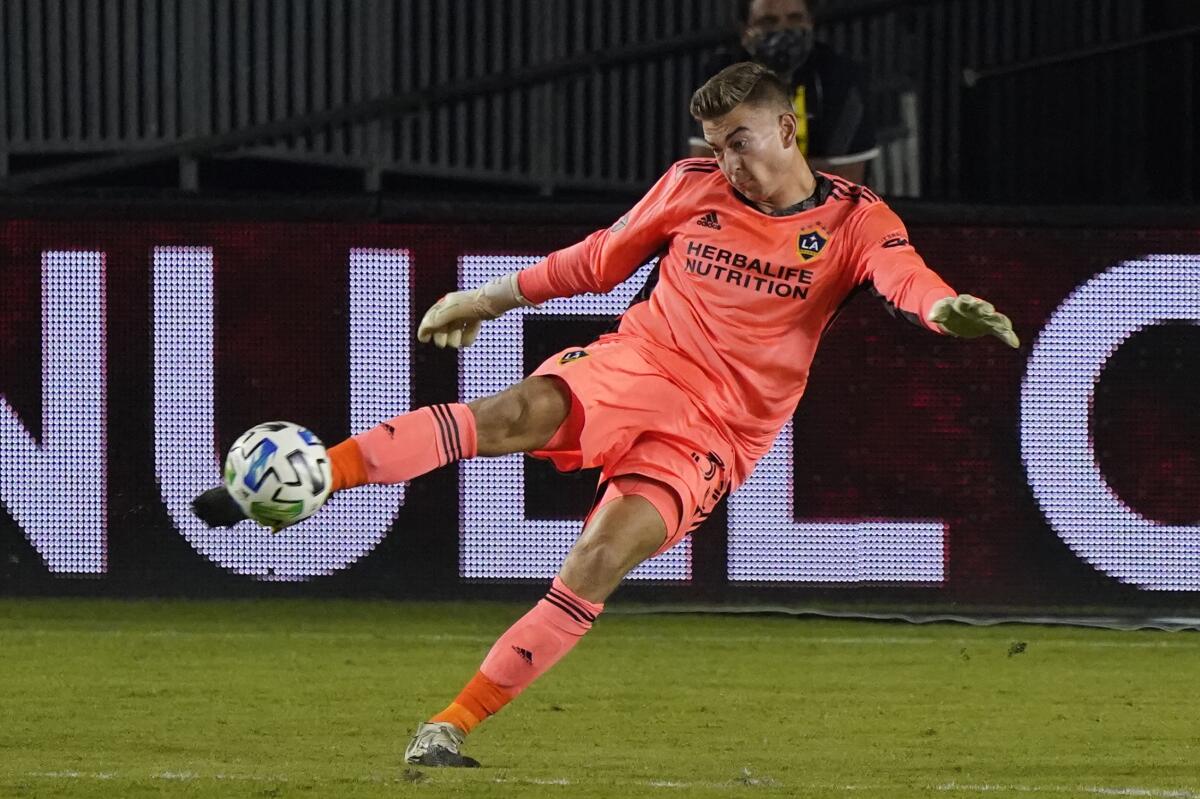
Galaxy and LAFC: A story of good and bad
One mark of a good team is it wins games it isn’t supposed to win. One mark of a bad team is it loses games it’s not supposed to lose.
Exhibits ‘A’ and ‘B’ in these two categories are the Galaxy and LAFC. The Galaxy haven’t lost since July 24 and last Saturday, playing without two of their best players, handed Minnesota United its first loss at home since May 1. LAFC, meanwhile, hasn’t won since July 17 and has scored just one goal this month. Its loss in Atlanta on Sunday was its third in a row.
A corollary to that first theory is good teams get great performances from unexpected sources while poor teams frequently are let down by their biggest stars. Both of those fit as well, with backup goalkeeper Jonathan Klinsmann matching a career high with seven saves in the Galaxy’s 1-0 win over Minnesota. LAFC, meanwhile, has gotten no goals and just one assist from Diego Rossi, the reigning MLS scoring champion, in its franchise-record, six-game winless streak.
“The goalkeeper’s performance today was unbelievable,” Minnesota United coach Adrian Heath said of Klinsmann, who recorded his second career shutout in his first start of the season. “I can’t fault my players, because if it wasn’t for about five unbelievable saves from the goalkeeper we would have got something out of the game.”
Klinsmann was playing in place of regular Jonathan Bond because the Galaxy were starting a streak of three games in seven days, one that continues Tuesday when they face Colorado at Dignity Health Sports Park. And Klinsmann’s effort for a team that was missing leading scorer Javier “Chicharito” Hernández to injury and national team captain Sebastian Lletget, who was with family after the death of his sister, was enough to lift the Galaxy briefly into first place in the Western Conference, the first time they’ve been there this late in a season since 2015.
Coach Greg Vanney later was asked if the victory was the team’s most impressive of the season.
“Possibly,” said Vanney, who got an assist from Dejan Joveljić in his first MLS game and a solid 90 minutes from defender Niko Hämäläinen, who became the 17th player to make his Galaxy debut under Vanney.
“Every win is important and every win is super valuable. We’re missing a few guys, but guys stepped up and filled the roles.”
Five of the players Vanney started weren’t with the team at the start of the season, including Kévin Cabral, who has scored the only Galaxy goals in the last two games, a win and a draw.
“The additions that we made over the course of the year and the group that we keep putting together just keeps getting deeper and deeper, which is important in a long MLS season that has twists and turns and national team call-ups and all the things that come with it,” Vanney said.
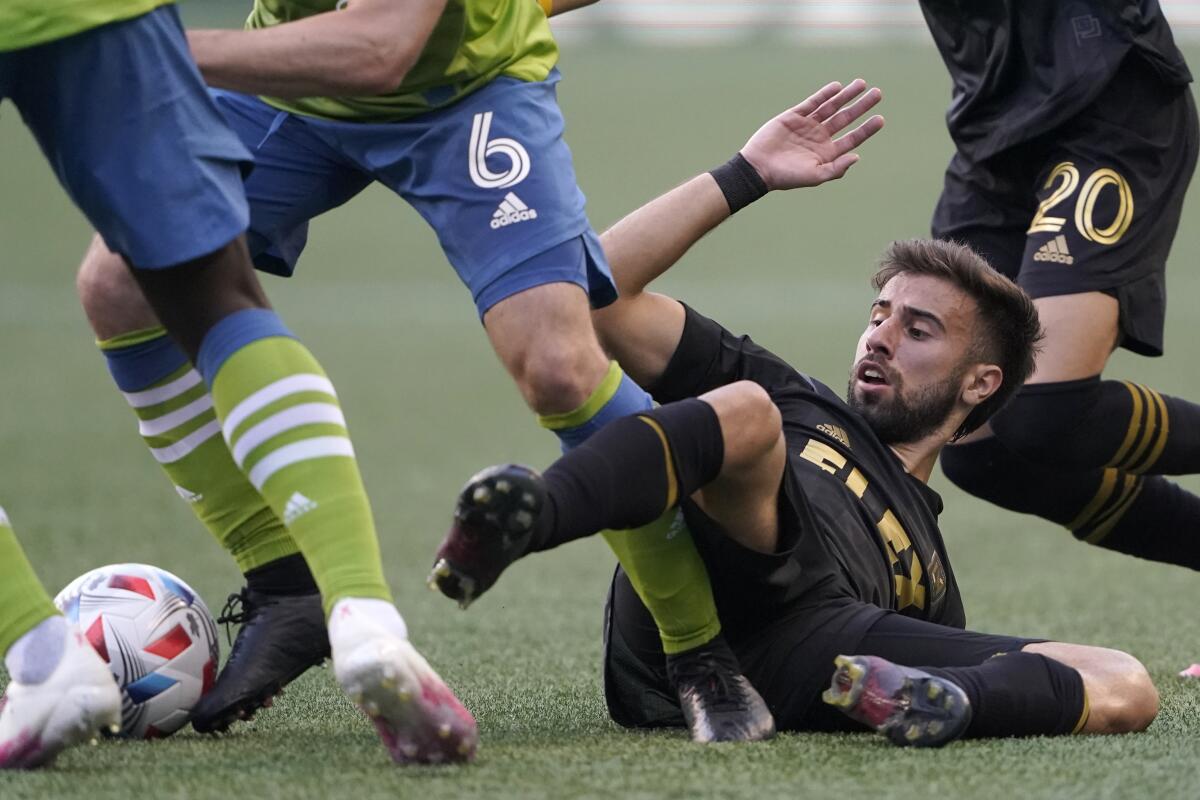
Then there’s LAFC, whose three consecutive losses are also a franchise record. No team scored more often than LAFC in its first three seasons, but this year a dozen teams have more goals. LAFC is averaging 1.26 goals a game, one fewer than it averaged through its first three seasons. And it hasn’t scored in 188 minutes.
“This is the most difficult stretch we’ve faced. We can’t get anything to go our way,” a frustrated coach Bob Bradley said.
“It’s a long list of little things,” he said of the team’s troubles. “It’s on me to figure out with all of [the players] — with what we do in training, with video, with talking to them, encouraging them, sometimes pushing them hard — to find the right message, the right tone for each guy. And for the team.
“That’s completely on me.”
Well, it’s on the players, too. Rossi and Carlos Vela, the last two MLS scoring champions, have 10 goals combined this season — the same number as the Galaxy’s Hernández, who hasn’t played since June.
“It’s hard to take the positive things when you lost,” Vela said. “There’s not too much to say. We have to keep working. I’m tired to lose. We have to change this situation.”
Vela was short on specifics for just how the team would do that.
“We have to work more. We have to work harder.” He said. “We have to win games.”
Even that might not be enough. The team looks demoralized, depressed, disjointed and defeated. The locker room leadership is either missing or ineffective and Bradley, for all his tinkering with formations and playing styles, has yet to find the right combinations.
He gets a week to search for answers before the team travels to Vancouver to meet the Whitecaps, 12th in the 13-team Western Conference, on Saturday.
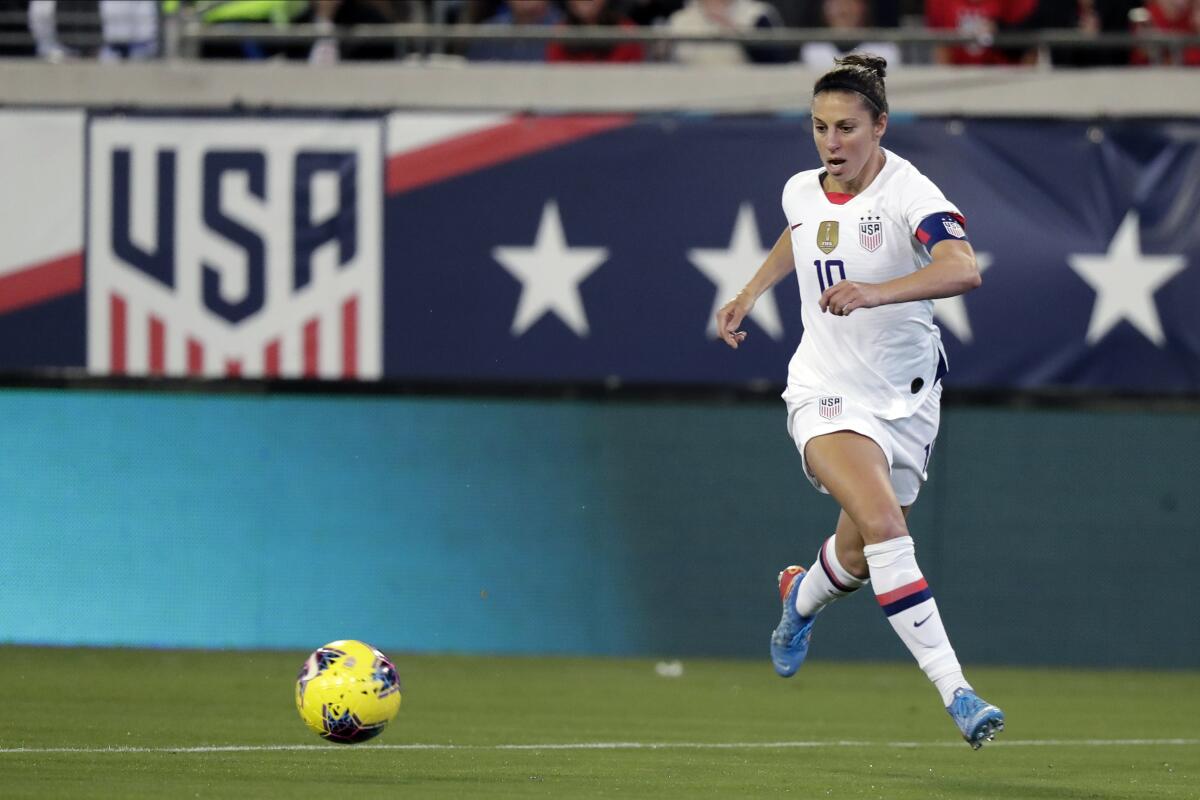
And finally there’s this …
Carli Lloyd, arguably the best big-game player in U.S. soccer history, announced her retirement from international competition Monday following a 17-year career in which was twice named FIFA world player of the year. Lloyd, 39, also won two Olympic gold medals — delivering the winning goal in both finals – and two World Cup titles. In this summer’s Tokyo Olympics, Lloyd scored twice in the third-place game to give the U.S. a bronze medal. She will finish the NWSL season with NJ/NY Gotham FC and play the four-game fall series with the USWNT before stepping down. ... U.S. national team players Christian Pulisic and Claudio Reyna each opened their European league seasons with goals, Pulisic scoring for Chelsea in a 3-0 win over Crystal Palace and Reyna for Borussia Dortmund, which beat Eintracht Frankfurt 5-2 … The U.S. is 10th in the latest FIFA rankings, one place behind Mexico. The ranking is the highest for the U.S. since 2006 and could prove significant since FIFA uses the rankings to place teams in pots before the World Cup draw … Angel City FC, Southern California’s fledging NWSL team, is closing in on its first signing, which could be announced within the next 10 days. The ownership group has been targeting national team star Christen Press, which probably would mean a package deal that also would include Tobin Heath. … Representatives for Galaxy defender Julian Araujo said last week’s reports that Araujo had declared his intention to play internationally for Mexico were premature. Araujo has not officially chosen between Mexico and the U.S. but is expected to do so soon. Araujo has the same agent as Real Salt Lake goalkeeper David Ochoa, who last week said he would play for Mexico.
Podcast
Don’t miss my weekly podcast on the Corner of the Galaxy site as co-host Josh Guesman and I discuss the Galaxy each Monday. You can listen to the most recent podcast episode here.
Quotebook
“When I first started out with the national team in 2005 my two main goals were to be the most complete soccer player I could be and to help the team win championships. Every single day I stepped out onto the field I played as if it was my last game. I never wanted to take anything for granted.”
Record-setting USWNT star Carli Lloyd, in a statement announcing her retirement
Until next time...
Stay tuned for future newsletters. Subscribe here, and I’ll come right to your inbox. Something else you’d like to see? Email me. Or follow me on Twitter: @kbaxter11.




